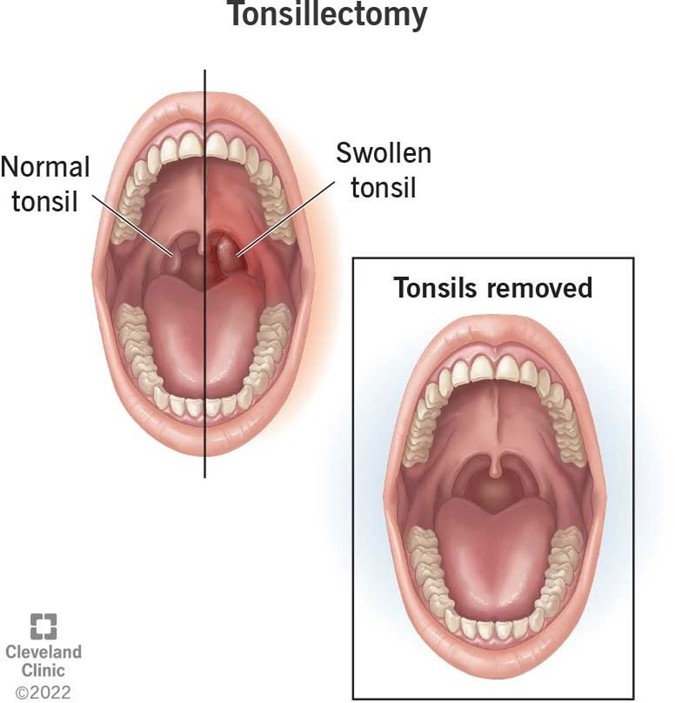A nurse is caring for a child who is 2 hours postoperative following a tonsillectomy. Which of the following fluid items should the nurse offer the child at this time?
Cranberry juice
Crushed ice
Orange juice
Strawberry milkshake
The Correct Answer is B
Choice A: Cranberry juice is not a suitable fluid item to offer the child at this time, as it is acidic and can irritate the throat and cause pain or bleeding. Cranberry juice can also stain the surgical site and make it difficult to assess for signs of hemorrhage.
Choice B: Crushed ice is a suitable fluid item to offer the child at this time, as it is cold and can soothe the throat and
reduce swelling or inflammation. Crushed ice can also hydrate the child and prevent dehydration.
Choice C: Orange juice is not a suitable fluid item to offer the child at this time, as it is acidic and can irritate the throat and cause pain or bleeding. Orange juice can also interfere with the clotting process and increase the risk of hemorrhage.
Choice D: A strawberry milkshake is not a suitable fluid item to offer the child at this time, as it contains dairy products and can increase mucus production and cause coughing or gagging. A strawberry milkshake can also stain the surgical site and make it difficult to assess for signs of hemorrhage.

Nursing Test Bank
Naxlex Comprehensive Predictor Exams
Related Questions
Correct Answer is D
Explanation
Choice A: A decreased heart rate is not a sign of pain in an infant, as pain usually causes an increased heart rate due to sympathetic nervous system activation. A decreased heart rate may indicate other problems, such as hypothermia, hypoxia, or bradycardia.
Choice B: A decreased respiratory rate is not a sign of pain in an infant, as pain usually causes an increased respiratory rate due to sympathetic nervous system activation. A decreased respiratory rate may indicate other problems, such as hypothermia, hypoxia, or respiratory depression.
Choice C: An increased formula consumption is not a sign of pain in an infant, as pain usually causes a decreased appetite and oral intake due to discomfort and distress. An increased formula consumption may indicate other factors, such as growth spurt, hunger, or thirst.
Choice D: An increased crying episode is a sign of pain in an infant, as crying is one of the most common and reliable indicators of pain in infants who cannot verbalize their feelings. An increased crying episode may also be accompanied by other signs of pain, such as facial grimacing, body tensing, or inconsolability.
Correct Answer is C
Explanation
Choice A reason: This choice is incorrect because 1 cup of cooked rice provides more than 1 oz of grains. According to the U.S. Department of Agriculture (USDA), one-ounce equivalent of grains equals one slice of bread, one cup of ready-to-eat cereal, or half a cup of cooked rice, pasta, or cereal. Therefore, 1 cup of cooked rice provides about 2 oz of grains.
Choice B reason: This choice is incorrect because 1/2 slice of white bread provides less than 1 oz of grains. As explained above, one-ounce equivalent of grains equals one slice of bread, so 1/2 slice of white bread provides only 0.5 oz of grains.
Choice C reason: This choice is correct because 1 cup of ready-to-eat cereal flakes provides exactly 1 oz of grains. As explained above, the one-ounce equivalent of grains equals one cup of ready-to-eat cereal, so 1 cup of ready-to-eat cereal flakes provides 1 oz of grains.
Choice D reason: This choice is incorrect because 1/2 white flour tortilla provides less than 1 oz of grains. According to the USDA, one-ounce equivalent of grains equals one small tortilla (6 inches in diameter), so 1/2 white flour tortilla provides only about 0.4 oz of grains.
Whether you are a student looking to ace your exams or a practicing nurse seeking to enhance your expertise , our nursing education contents will empower you with the confidence and competence to make a difference in the lives of patients and become a respected leader in the healthcare field.
Visit Naxlex, invest in your future and unlock endless possibilities with our unparalleled nursing education contents today
Report Wrong Answer on the Current Question
Do you disagree with the answer? If yes, what is your expected answer? Explain.
Kindly be descriptive with the issue you are facing.
